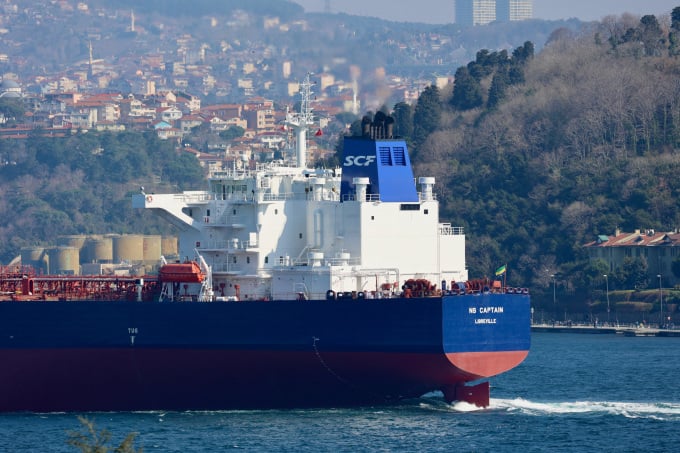Russian companies have to wait up to several months to receive payment for oil sales, as banks are wary of secondary US sanctions.
Eight sources from banks and traders cited by Reuters say that some banks in China, the UAE, and Turkey have stepped up demands for compliance with U.S. sanctions in recent weeks. This has led to delays or even refusals in payments for crude oil purchases from Russia.
Specifically, the banks require buyers of Russian crude oil to provide written assurances that no individuals or entities involved in or benefiting from the transaction are on the U.S. Special Designated Nationals (SDN) list.
SDN is a list published by the U.S. government of individuals and organizations with whom the country prohibits or restricts business dealings. Financial institutions are often required to comply with SDNs to avoid violating U.S. legal regulations and sanctions.

The crude oil tanker NS Captain, owned by the Russian oil tanker company Sovcomflot, passes through the Bosphorus Strait in Istanbul, Turkey, on February 22. Photo: Reuters
In the UAE, First Abu Dhabi Bank (FAB) and Dubai Islamic Bank (DIB) have suspended several accounts linked to Russian commodity transactions. Meanwhile, Mashreq Bank (UAE), Ziraat and Vakifbank (Turkey), ICBC and Bank of China (China) are still processing transactions, but it can take weeks or months.
Sources say payments are being delayed by 2-3 weeks, or even up to 2 months. "Things are getting difficult, even not just with USD transactions. Sometimes it takes several weeks for a direct transaction in yuan - ruble - to be completed," said one trader.
Kremlin spokesman Dmitry Peskov confirmed that the problem of delayed payments by banks in China persists. According to him, the US and the European Union continue to exert unprecedented pressure on China. "Of course, this creates certain problems, but it is not an obstacle to further development in our economic and trade relations," Peskov said.
The West imposed a series of sanctions on Russia following the Ukraine conflict in February 2022. Transactions with Russian oil remain legal as long as they are below the $60 per barrel cap they imposed.
Russian oil exports were disrupted in the early months following the conflict but normalized as Moscow shifted to selling to Asian and African customers. However, by December 2023, collecting payments for oil sales became more difficult as banks and businesses realized the real threat of secondary US sanctions.
This stems from the US Treasury Department 's move on December 22nd, warning that it could impose sanctions on foreign banks that circumvent the Russian oil price ceiling and calling for increased compliance.
Following orders from the US, banks in China, the UAE, and Türkiye that work with Russia have stepped up scrutiny, begun requesting additional documentation, and provided further training for staff to ensure oil transactions comply with price caps.
They also require both parties to the transaction to provide additional documentation, including details of the ownership of all companies involved in the transaction, and data on individuals controlling the parties in the transaction so that the bank can verify whether they are on the SDN list.
Phiên An ( Reuters )
Source link




![[Photo] General Secretary To Lam working with the Central Inspection Committee](https://vphoto.vietnam.vn/thumb/1200x675/vietnam/resource/IMAGE/2026/03/05/1772718314670_a1-bnd-8682-5192-jpg.webp)


![[Photo] Prime Minister Pham Minh Chinh receives the Minister of Emergency Situations of the Russian Federation.](https://vphoto.vietnam.vn/thumb/1200x675/vietnam/resource/IMAGE/2026/03/05/1772712011395_ndo_br_thiet-ke-chua-co-ten-76-png.webp)







































































































Comment (0)